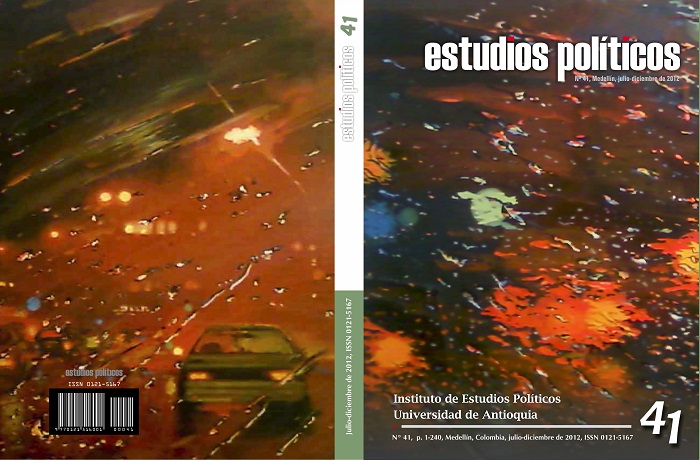La comunidad humana (polis) como condición de la libertad en la ética aristotélica
DOI:
https://doi.org/10.17533/udea.espo.14367Palavras-chave:
Libertad, Aristóteles, Ética, Comunidad Humana, EducaciónResumo
El artículo corresponde a un trabajo de síntesis en torno a las condiciones de la libertad en la ética aristotélica. En este caso, se hace un énfasis particular en lo que he llamado “la condición política de la libertad humana”. La tesis que se defiende es que para hablar de seres humanos libres —en sentido estricto— la comunidad humana desempeña un papel esencial. Esto en contraposición a las vertientes filosóficas que abogan por una libertad individualista y que ven a la sociedad como un obstáculo para la libertad del ser humano o en contra de quienes privilegian la libertad negativa como el papel fundamental del Estado. Para ello, se hará uso de la filosofía aristotélica con el fin de establecer un diálogo que permita abordar el tema de la libertad desde las inquietudes que ocupan hoy día este estudio.
Downloads
Referências
(1) Aristóteles. (1994). Ética Nicomáquea. Traducción y edición bilingüe por María Araújo y Julián Marias. Introducción y notas de Julian Marías. Madrid: Centro de Estudios Constitucionales.
(2) Aristóteles. (1970). Éthique à Nicomaque. Segunda edición. Introducción, traducción y comentarios de René Antoine Gauthier y Jean Yves Jolif. Lovaina: Institut supérieur de philosophie de l’université de Louvain.
(3) Aristóteles. (1997). Éthique à Nicomaque. Introducción, traducción, notas e índice de J. Tricot. Paris: J. Vrin.
(4) Aristóteles. (1994). Nikomachische Ethik. Traducción y notas por Franz Dirlmeier. Berlin: Reclam.
(5) Aristóteles. (1999). Política. Introducción, traducción y notas de Manuel García Valdés. Gredos: Madrid. 490 p.
(6) Aristóteles. (1960). Politique (Livres 1 et 2). Texto establecido y traducido por Jean Aubonet. Paris: Les Belles Lettres.
(7) Austin, John Langshaw. (1989). Un alegato en pro de las excusas. En: Ensayos filosóficos. Madrid: Alianza.
(8) Festugière, André Jean .(1972). Libertad y civilización entre los griegos. Buenos Aires: Universitaria de Buenos Aires.
(9) Kant, Immanuel. (2003). Fundamentación de la metafísica de las costumbres. Madrid: Encuentro.
(10) Tugendhat, Ernst. (1997). Lecciones de Ética. Barcelona: Gedisa.
(11) Tugendhat, Ernst. (2004). Egocentricidad y mística, un estudio antropológico. Barcelona: Gedisa.
Publicado
Como Citar
Edição
Seção
Licença
La revista Estudios Políticos autoriza la copia de artículos y textos únicamente con fines académicos, bajo la condición ineludible de citar la fuente. Para la reproducción total o parcial de la Revista con otros fines, se debe contar con la autorización explícita del Instituto de Estudios Políticos de la Universidad de Antioquia, previa consulta al correo electrónico [email protected]
Los autores son los titulares de los derechos morales de sus artículos y pueden archivar y divulgar citando la fuente. Estudios Políticos asume los derechos de reproducción.
El material creado por usted puede ser distribuido, copiado y exhibido por terceros si se muestra en los créditos. No se puede obtener ningún beneficio comercial y las obras derivadas tienen que estar bajo los mismos términos de licencia que el trabajo original.
Esta obra está bajo una licencia de Creative Commons Reconocimiento-NoComercial-CompartirIgual 4.0 Internacional










